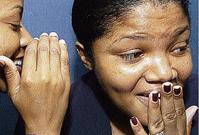Paul Messam, Contributor

Ricardo Makyn/Staff Photographer
Gossip is a form of 'triangling', with which we are all familiar. It can be damaging and can cause hurt and contention.
When a fire finishes burning through the material it feeds on, it goes out. Similarly, when gossip reaches the ear of someone who will not repeat it, it dies a natural death. But can we say we really care about people if we never talk about them?
Casual talk can easily turn into harmful gossip. For example, look at this innocent comment: "Janice and Danny would make a first-class couple." It might be repeated as "Janice and Danny are a couple" - even though Janice and Danny knew nothing of their supposed romance.
Not a serious problem, you might say, unless you were Janice and Danny!
victim
Tricia, age 24, was the victim of that kind of gossip, and hurt. "It made me angry," she says and "it raised doubts in me about trusting others."
A friend of Opal Peart, from Mandeville, returned from a birthday bashment with her extended family where the underground anxiety had been quite high. This party was the first without her maternal grandparents, who had both died during the past year. "It was zoo!" my friend exclaimed upon her return home. "My aunt was cornering me to tell me how my mother is not taking care of her appearance; my mother was angry at her brother and did not want me to sit next to him; my father cornered me to tell me in hushed tones about my mother's crying spells ... and so it went." No one talked about the missing grandparents and how sad the family was that they were not there. Gossip was at its highest peak.
"Unconstrained talk or writing about a person; idle talk" is how the Oxford Dictionary describes gossip.
"Gossip is idle personal talk; groundless rumour, slander is defamation, generally malicious, whether oral or written," says Dr. Heather Ricketts, of the Dept of Sociology/Psychology at the University of the West Indies, (UWI), Mona. "If you cannot say it in the affirmative, then there is nothing to say.
When people come to you with gossip it should not be entertained; gossip does not build up. Let people know it is not something to be entertained."
Dr. Ricketts suggests that the following questions should be asked:
1. Were you there?
2. Did you see?
3. Did you hear?
If you cannot answer them, then it's gossip. She says that we should get people to speak openly and honestly to move away from the unhealthy tide of gossip.
Today, gossip has gone high-tech with the birth of the e-mail and Internet. A man or woman can tarnish another person's reputation without even uttering a single word. All it takes is a few keystrokes to send a vicious rumour on its was to a hungry, eager recipient.
Dr. Ricketts further states that when disparaging remarks are made about someone, it can be very tempting to join in. Why?
"It's an escape. Some persons would rather focus on other people's problem than their own."
Here is a start to avoid gossip. Think about the skill that is necessary to drive on the new highway. Unexpectedly, a situation may arise that makes it necessary for you to change lanes, yield or come to a complete stop. Now, if you are alert and safety conscious, you will see what is ahead and react accordingly. It is similar with a conversation. You can usually tell when a discussion is veering into harmful gossip. When this happens, change gears, change the course. People need to be careful of what they say, when, where, and how and with whom.
Things to do if you become the victim of baseless rumours.
1. Control your emotions: One who is injured by harmful gossip and fails to keep his feelings of embarrassment and resentment could react in a way that he will later regret.
2. Look behind the words: Try to understand the what motivates people to gossip.
3. Discern the actual intent: Ask yourself these questions:
(a) Am I certain that what I heard was actually said about me?
(b) Is it a rumour or a serious misunderstanding?
(c) Am I being too sensitive?
"It is best to always follow the golden rule, and do to others what you would like them do to you." says Dr. Ricketts.

